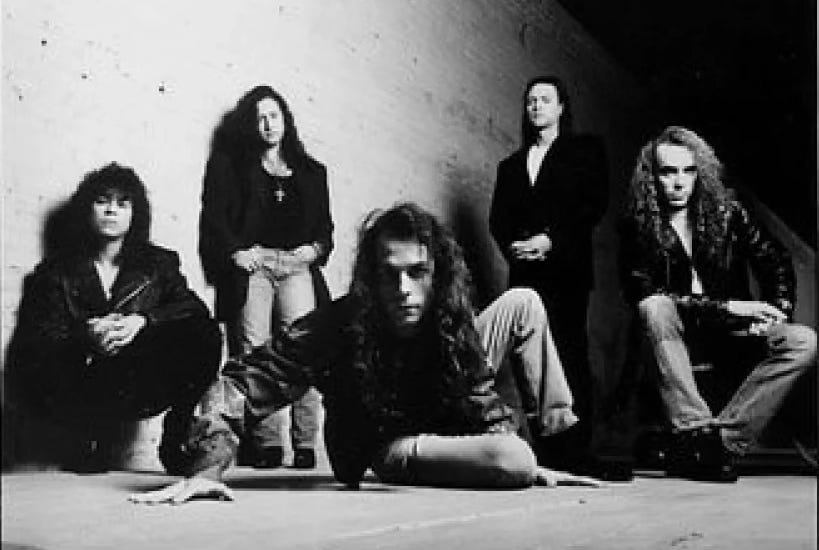Queensrÿche | History of the Band
From 'Empire' to Experimentation: Progressive Metal Pioneers Metamorphosis in the 90s"
Queensrÿche, a band originating from Bellevue, Washington, in 1981, carved a unique path in the heavy metal and rock genres, especially during the transformative 1990s. Their journey through this decade is a tale of musical evolution, commercial success, and artistic exploration as they navigated the changing landscapes of the music industry.
Formation and Early Years
Queensrÿche's roots trace back to the late 1970s, with guitarist Michael Wilton forming the band Joker. The lineup solidified with Chris DeGarmo, Scott Rockenfield, and Eddie Jackson joining forces. The group initially covered heavy metal songs, performing under various names before settling on Queensrÿche in 1981. The band's name, a creative variation of their song "Queen of the Reich," was chosen to avoid any association with Nazism, as 'ryche' is a Middle English cognate similar to the German word 'Reich'.
Eric Peterson suggested this artist for a future Dig Me Out podcast episode. Each month, our Patrons are presented with a selection of albums suggested by listeners and asked to vote for their favorite. The album with the most votes is given another minute in the spotlight. Vote and share your thoughts.
Musical Style and Evolution
Throughout the 1990s, Queensrÿche distinguished itself with its progressive metal style, blending heavy metal with complex arrangements and thematic depth. They were known for addressing social and political issues in their music, a trend that continued into the 90s. Their sound evolved to incorporate softer love songs while maintaining their heavier, more traditional metal sound, ensuring their relevance throughout the decade.
Discography and Notable 90s Albums
"Empire" (1990): Released by EMI, "Empire" stands as Queensrÿche's most commercially triumphant album. It marked a distinct shift from the concept album style of "Operation: Mindcrime," embracing a mix of progressive rock and pop/rock elements. The album addressed various social issues, showcasing the band's versatility. "Empire" sold over three million copies in the U.S. and produced several hits, including the iconic "Silent Lucidity," which reached No. 9 on the Billboard Hot 100 chart. This album's success catapulted Queensrÿche to new heights, both commercially and artistically.
"Operation: Livecrime" (1991): This pivotal live album/video boxed set by Queensryche, released by EMI, captures the full live performance of their iconic album "Operation: Mindcrime." It was recorded during their tour in support of the "Empire" album in May 1991 across various locations in Wisconsin. The set was initially released in two versions, featuring both a videocassette and a CD or audio cassette, encompassing the entire live performance. The album reached the 38th position on the US Billboard 200 chart, reflecting its significant impact.
"Promised Land" (1994): This album continued Queensrÿche's exploration of more introspective and complex themes. While it didn't achieve the commercial heights of "Empire," it was critically acclaimed for its sophisticated approach and musical innovation. The band delved deeper into personal and social issues, using a more nuanced sound palette. The album's reception reinforced Queensrÿche's position as a band, unafraid to experiment and evolve beyond the expectations of the heavy metal genre.
"Hear in the Now Frontier" (1997): Released by EMI, this album represented another evolutionary step for Queensrÿche. While it received mixed reviews, it demonstrated the band's willingness to experiment with their sound. The album leaned towards a mainstream rock approach, a departure from their previous, more complex compositions. Despite its varied reception, "Hear in the Now Frontier" showcased Queensrÿche's continued commitment to pushing the boundaries of their music.
Influence and Legacy
Queensrÿche's influence extended beyond their commercial success. They were pivotal in shaping the progressive metal genre and inspired numerous bands that followed. Their unique sound, characterized by Geoff Tate's operatic vocals and the intricate guitar work of DeGarmo and Wilton, left a lasting impact on the music industry. The band's ability to merge heavy metal with more intellectually challenging themes set them apart from their contemporaries.
Critical Reception
Critically, Queensrÿche's work in the 1990s was well-received, with "Empire" particularly notable for its commercial and artistic success. The band's exploration of different musical styles and themes while staying true to their metal roots was praised by critics and fans alike.
Conclusion
Queensrÿche's journey through the 1990s is a testament to their ability to adapt and evolve while maintaining their unique identity in music. Their blend of progressive metal with thought-provoking themes and diverse musical influences marked them as pioneers in their genre, contributing significantly to the tapestry of 90s music.
Sources
Wikipedia
BLABBERMOUTH.NET
Loudwire
Encyclopedia.com
AllMusic.com




There is a 1991 live boxset (Operation: LIVEcrime) missing between E and PL involving the concert presentation of QR’s Operation:Mindcrime recorded and filed in Wisconsin on the Empire tour.